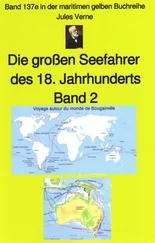I leave you to judge how eyes were used on board the Abraham Lincoln.
For my own part I was not behind the others, and, left to no one my share of daily observations. The frigate might have been called the Argus, for a hundred reasons. Only one amongst us, Conseil, seemed to protest by his indifference against the question which so interested us all, and seemed to be out of keeping with the general enthusiasm on board.
I have said that Captain Farragut had carefully provided his ship with every apparatus for catching the gigantic cetacean. No whaler had ever been better armed. We possessed every known engine, from the harpoon thrown by the hand to the barbed arrows of the blunderbuss, and the explosive balls of the duck-gun. On the forecastle lay the perfection of a breech-loading gun, very thick at the breech, and very narrow in the bore, the model of which had been in the Exhibition of 1867. This precious weapon of American origin could throw with ease a conical projectile of nine pounds to a mean distance of ten miles.
Thus the Abraham Lincoln wanted for no means of destruction; and, what was better still she had on board Ned Land, the prince of harpooners.
Ned Land was a Canadian, with an uncommon quickness of hand, and who knew no equal in his dangerous occupation. Skill, coolness, audacity, and cunning he possessed in a superior degree, and it must be a cunning whale to escape the stroke of his harpoon.
Ned Land was about forty years of age; he was a tall man (more than six feet high), strongly built, grave and taciturn, occasionally violent, and very passionate when contradicted. His person attracted attention, but above all the boldness of his look, which gave a singular expression to his face.
Who calls himself Canadian calls himself French; and, little communicative as Ned Land was, I must admit that he took a certain liking for me. My nationality drew him to me, no doubt. It was an opportunity for him to talk, and for me to hear, that old language of Rabelais, which is still in use in some Canadian provinces. The harpooner's family was originally from Quebec, and was already a tribe of hardy fishermen when this town belonged to France.
Little by little, Ned Land acquired a taste for chatting, and I loved to hear the recital of his adventures in the polar seas. He related his fishing, and his combats, with natural poetry of expression; his recital took the form of an epic poem, and I seemed to be listening to a Canadian Homer singing the Iliad of the regions of the North.
I am portraying this hardy companion as I really knew him. We are old friends now, united in that unchangeable friendship which is born and cemented amidst extreme dangers. Ah, brave Ned! I ask no more than to live a hundred years longer, that I may have more time to dwell the longer on your memory.
Now, what was Ned Land's opinion upon the question of the marine monster? I must admit that he did not believe in the unicorn, and was the only one on board who did not share that universal conviction. He even avoided the subject, which I one day thought it my duty to press upon him. One magnificent evening, the 30th July (that is to say, three weeks after our departure), the frigate was abreast of Cape Blanc, thirty miles to leeward of the coast of Patagonia. We had crossed the tropic of Capricorn, and the Straits of Magellan opened less than seven hundred miles to the south. Before eight days were over the Abraham Lincoln would be ploughing the waters of the Pacific.
Seated on the poop, Ned Land and I were chatting of one thing and another as we looked at this mysterious sea, whose great depths had up to this time been inaccessible to the eye of man. I naturally led up the conversation to the giant unicorn, and examined the various chances of success or failure of the expedition. But, seeing that Ned Land let me speak without saying too much himself, I pressed him more closely.
"Well, Ned," said I, "is it possible that you are not convinced of the existence of this cetacean that we are following? Have you any particular reason for being so incredulous?"
The harpooner looked at me fixedly for some moments before answering, struck his broad forehead with his hand (a habit of his), as if to collect himself, and said at last, "Perhaps I have, Mr. Aronnax."
"But, Ned, you, a whaler by profession, familiarised with all the great marine mammalia—YOU ought to be the last to doubt under such circumstances!"
"That is just what deceives you, Professor," replied Ned. "As a whaler I have followed many a cetacean, harpooned a great number, and killed several; but, however strong or well-armed they may have been, neither their tails nor their weapons would have been able even to scratch the iron plates of a steamer."
"But, Ned, they tell of ships which the teeth of the narwhal have pierced through and through."
"Wooden ships—that is possible," replied the Canadian, "but I have never seen it done; and, until further proof, I deny that whales, cetaceans, or sea-unicorns could ever produce the effect you describe."
"Well, Ned, I repeat it with a conviction resting on the logic of facts. I believe in the existence of a mammal power fully organised, belonging to the branch of vertebrata, like the whales, the cachalots, or the dolphins, and furnished with a horn of defence of great penetrating power."
"Hum!" said the harpooner, shaking his head with the air of a man who would not be convinced.
"Notice one thing, my worthy Canadian," I resumed. "If such an animal is in existence, if it inhabits the depths of the ocean, if it frequents the strata lying miles below the surface of the water, it must necessarily possess an organisation the strength of which would defy all comparison."
"And why this powerful organisation?" demanded Ned.
"Because it requires incalculable strength to keep one's self in these strata and resist their pressure. Listen to me. Let us admit that the pressure of the atmosphere is represented by the weight of a column of water thirty-two feet high. In reality the column of water would be shorter, as we are speaking of sea water, the density of which is greater than that of fresh water. Very well, when you dive, Ned, as many times 32 feet of water as there are above you, so many times does your body bear a pressure equal to that of the atmosphere, that is to say, 15 lb. for each square inch of its surface. It follows, then, that at 320 feet this pressure equals that of 10 atmospheres, of 100 atmospheres at 3,200 feet, and of 1,000 atmospheres at 32,000 feet, that is, about 6 miles; which is equivalent to saying that if you could attain this depth in the ocean, each square three-eighths of an inch of the surface of your body would bear a pressure of 5,600 lb. Ah! my brave Ned, do you know how many square inches you carry on the surface of your body?"
"I have no idea, Mr. Aronnax."
"About 6,500; and as in reality the atmospheric pressure is about 15 lb. to the square inch, your 6,500 square inches bear at this moment a pressure of 97,500 lb."
"Without my perceiving it?"
"Without your perceiving it. And if you are not crushed by such a pressure, it is because the air penetrates the interior of your body with equal pressure. Hence perfect equilibrium between the interior and exterior pressure, which thus neutralise each other, and which allows you to bear it without inconvenience. But in the water it is another thing."
"Yes, I understand," replied Ned, becoming more attentive; "because the water surrounds me, but does not penetrate."
"Precisely, Ned: so that at 32 feet beneath the surface of the sea you would undergo a pressure of 97,500 lb.; at 320 feet, ten times that pressure; at 3,200 feet, a hundred times that pressure; lastly, at 32,000 feet, a thousand times that pressure would be 97,500,000 lb.—that is to say, that you would be flattened as if you had been drawn from the plates of a hydraulic machine!"
Читать дальше












